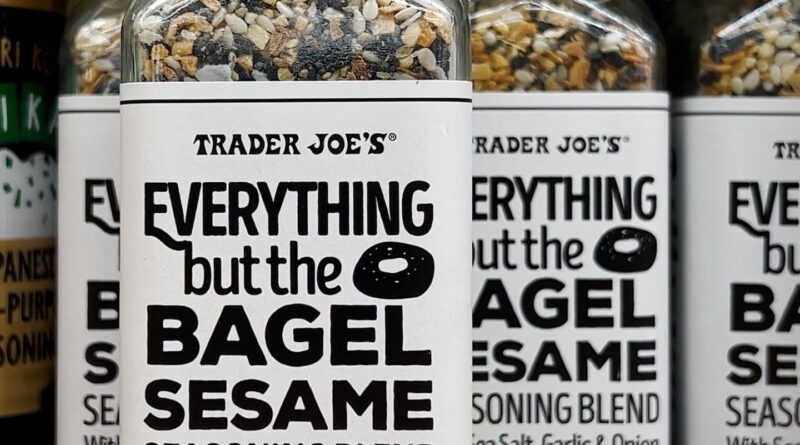This Trader Joe’s seasoning is a hot item. In South Korea, it’s illegal.
South Korea’s Ministry of Food and Drug Safety has the bagel seasoning on its list of “hazardous foods purchased overseas” — and in recent weeks, some South Koreans who have had it confiscated at the airport have warned other Trader Joe’s aficionados about the consequences of bringing it in.
South Korean law classifies poppy seeds — an ingredient in the seasoning — as a narcotic, meaning possession is punishable by up to five years in prison or a fine of about $36,000. While punishment is rare, it seems those coming to the country will have to bring anything but Everything but the Bagel.
Kang Joo-eun, 31, read about the ban on social media the night before she returned to South Korea from her honeymoon in New York. She was planning to bring the seasoning but she eventually decided against it.
To her surprise, after she landed in South Korea, Kang was pulled aside for inspection. “Agents walked around showing people a picture of Everything but the Bagel seasoning and took away the jars,” she said. It turned out she had forgotten to discard nuts that were coated with the same seasoning.
GET CAUGHT UP
Stories to keep you informed
Kang was asked to fill out a customs form declaring that she brought a narcotic item into the country. “It was all around an unpleasant experience,” she said.
Officials at Seoul’s Incheon International Airport confirmed that they have been confiscating the product and said “most travelers have been cooperative.”
Until now, the law in South Korea was little known, despite the authorities adding Everything but the Bagel seasoning to a list of restricted foods in 2022. On social media, South Koreans recommend it as a gift from the United States. A local e-commerce platform appeared to sell Everything but the Bagel products online and at least one bagel shop in Seoul has the seasoning on display near its cash register. All of this is the result of the soaring popularity of Trader Joe’s in a region where people carry the chain’s totes as a fashion statement.
In this context, a crackdown on a bagel topping might sound absurd — but it reflects the broader mixed messaging around poppy seeds.
Even in the United States, where you can eat all the poppy-seed muffins you please, the seeds have sown confusion. Last year, the Department of Defense issued a warning to military personnel that eating poppy seeds can produce a positive drug test — despite military dining halls previously serving poppy-seed dressing.
While experts say it is not possible to eat enough poppy seeds to have a narcotic effect, other countries, including the United Arab Emirates, Saudi Arabia and Singapore also have restrictions on them. In 2014, an Indian farmer was imprisoned after bringing poppy seeds on a flight to Dubai, Indian media reported.
Gary Reisfield, an associate professor at the University of Florida’s psychiatry department and expert in substance use disorders, says the rationale behind these laws “is the potential for the extraction of opioids from poppy seeds.” Depending on their geographic origin, some unwashed poppy seeds have on them measurable amounts of opioids, including codeine and morphine, he said. Large amounts of opiate-rich seeds can be used to make a narcotic tea, which is associated with intoxication, overdose and opioid use disorder.
To Reisfield though, the most common risk associated with consuming poppy seeds is failing a drug test, which can happen from “sometimes as little as a single poppy seed bagel.”
While many commercially available poppy seeds contain little or no opioids, he said there is “no way to know for sure without sending your bagels out to a laboratory for testing.”
In South Korea, there are parts of the country’s narcotics law “where there is a gap” with “reality and/or international trends,” said Kristen Lee, an attorney at the Lee & Lee law firm in Seoul, in an email — pointing to a strict ban on cannabidiol, or CBD, a chemical derived from the cannabis plant that is not known to have any psychoactive properties and is marketed as a sleep supplement or stress reliever.
Perhaps because of that gap, poppy seeds have at times been overlooked. At one point, several major e-commerce platforms in South Korea were selling salad dressing that contained poppy seeds, Lee said. And there are often cases where individuals who bought poppy seeds are subject to criminal investigation and summoned by the authorities, she said.
Still, people are typically not punished for their possession of this particular contraband. “Most of the consumers who bring/possess poppy seed-containing products are innocent,” she said.




